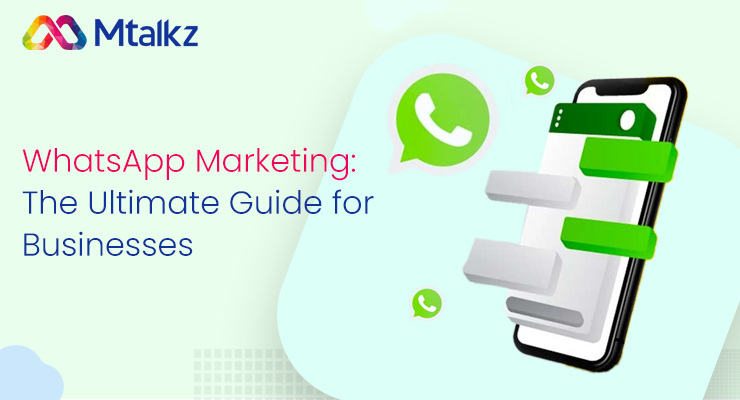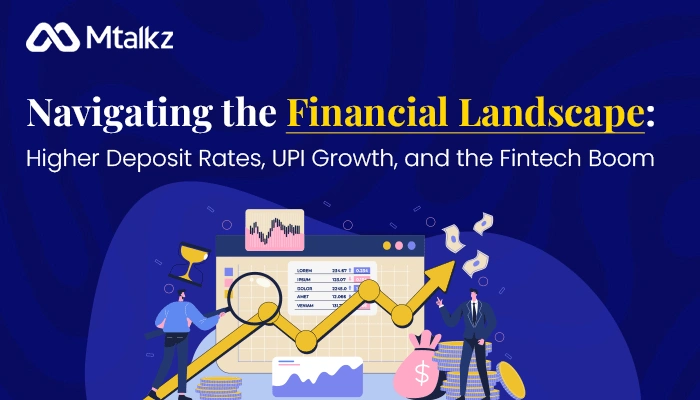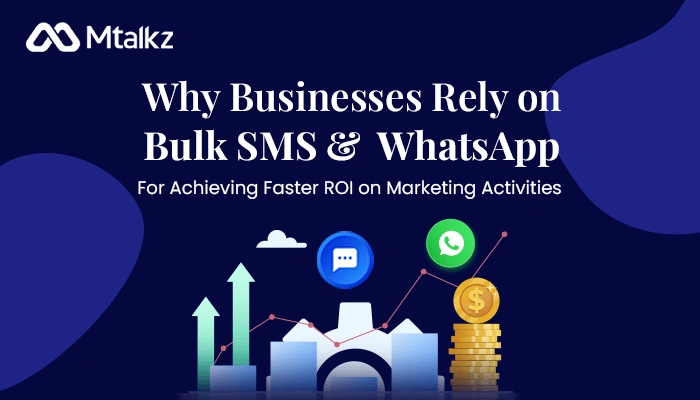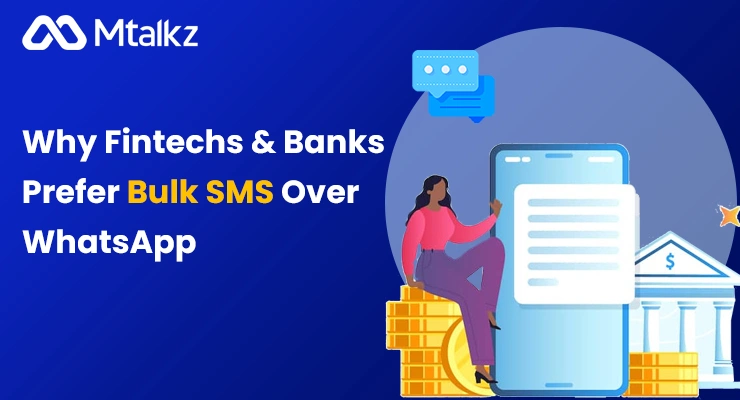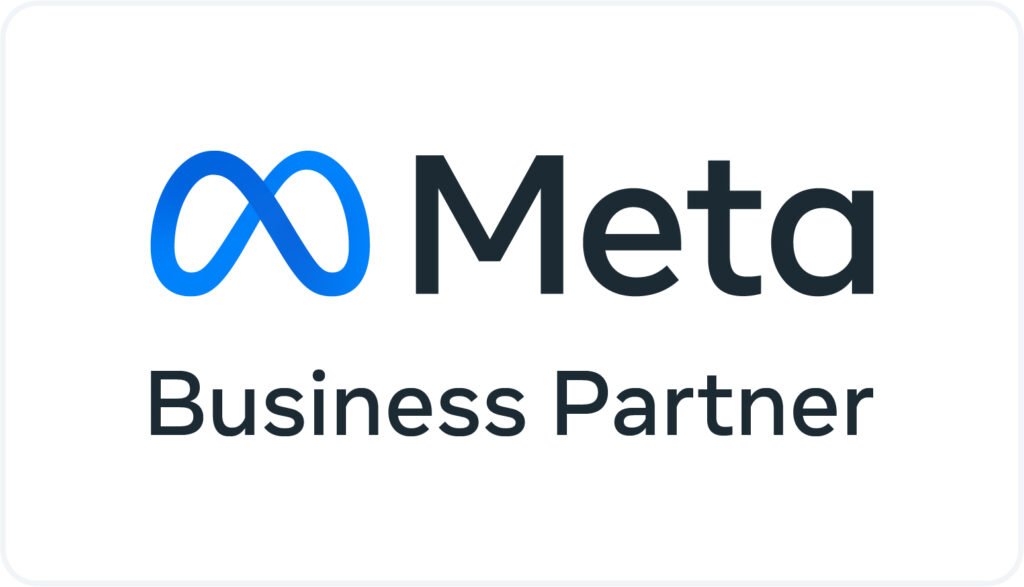In the ever-evolving landscape of digital marketing, businesses are constantly seeking innovative ways to connect with their audience. WhatsApp, once a simple messaging app, has transformed into a powerful marketing tool for businesses of all sizes. In this blog, we will delve into the world of WhatsApp Marketing, exploring its significance, strategies, and how businesses can leverage this platform to enhance their marketing efforts.
What is WhatsApp Marketing
WhatsApp Marketing involves the use of the popular messaging app, WhatsApp, as a means to communicate, engage, and promote products or services. With over 2.7 billion monthly active users globally, WhatsApp provides a vast and diverse audience for businesses to tap into. Unlike traditional forms of marketing, WhatsApp Marketing allows for personalized and direct communication with customers, fostering a more intimate and interactive relationship.
WhatsApp Marketing is all about using the personal and direct nature of messaging to connect with customers in a more immediate and interactive way. It’s like having a conversation with your customers on a platform they already use for personal communication, but now it’s also a channel for businesses to share information and build relationships.
Book a free WhatsApp Marketing consultation with our Experts
Importance of WhatsApp Marketing in Business
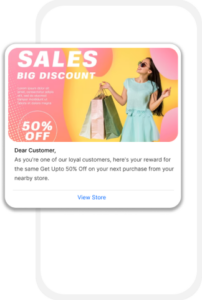
WhatsApp Marketing is crucial for businesses, especially the ones dealing directly with end users because it allows them to communicate directly with customers in a more personal and immediate way. Unlike traditional advertising, WhatsApp enables businesses to engage with their audience on a platform that people use regularly for personal communication.
This direct line of communication increases the chances of messages being seen and engaged with. With the ability to share multimedia content, provide customer support, and reach a global audience, WhatsApp offers a versatile and cost-effective marketing channel.
The platform’s privacy features and end-to-end encryption also contribute to building trust with customers. WhatsApp Marketing is valuable for businesses looking to connect, engage, and build relationships with their audience in a dynamic and interactive manner.
Understanding WhatsApp Marketing Features
WhatsApp is not only a popular messaging app for personal communication but has also become a powerful tool for marketing and business communication. Understanding its features is crucial for businesses to leverage its potential in the marketing domain. Let’s look at the key aspects:
Messaging
![]()
Businesses can send multimedia content like images, videos, and GIFs to convey information in a more visually appealing manner. This feature is particularly useful for showcasing products, sharing tutorials, or providing a behind-the-scenes look at the business.
Status Updates
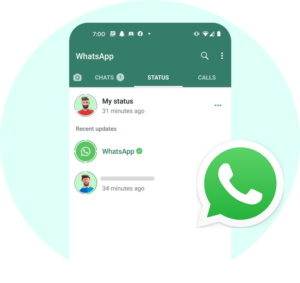
WhatsApp Status is a feature that allows users to share updates, photos, and videos that disappear after 24 hours. Businesses can use this feature for:
Storytelling: Use Status updates to tell a short story about your brand or highlight special events.
Limited-Time Offers: Promote exclusive deals or discounts for a limited time to create a sense of urgency.
Engagement: Encourage user engagement by asking questions or conducting polls through status updates.
WhatsApp Groups
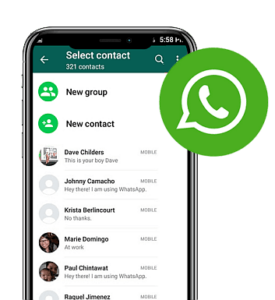
WhatsApp groups are a powerful way to connect with a community or audience. Businesses can use this feature for:
Community Building: Create groups related to your business niche to foster a sense of community among your customers.
Exclusive Updates: Provide exclusive content or updates to group members, making them feel valued.
Customer Support: Use groups for customer support, allowing members to ask questions and share their experiences.
WhatsApp Flows
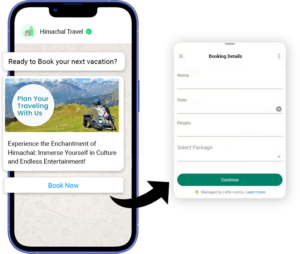
WhatsApp flows, recently launched on the WhatsApp Business Platform, empowers businesses to seamlessly integrate experiences like seat selection, meal ordering, and appointment booking directly within the chat interface. This feature enables businesses to offer rich menus and customizable forms to cater to diverse needs globally.
WhatsApp Channels
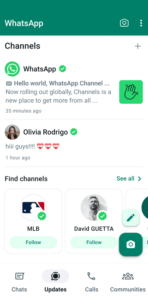
WhatsApp also recently introduced channels, offering users a secure platform to receive updates from various organizations, sports teams, artists, and thought leaders directly within the app. Channels are a one-way broadcast tool for admins to send text, photos, videos, stickers, and polls. WhatsApp channels operate independently from personal chats, ensuring the privacy of both followers and administrators.
Payments Service
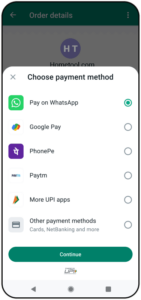
WhatsApp has now simplified the purchase process directly within the chat. Individuals in India have the ability to add items to their cart and execute payments through various supported methods, including UPI apps, debit and credit cards. WhatsApp has streamlined the payment processes, making it as straightforward as sending a message.
WhatsApp Business API
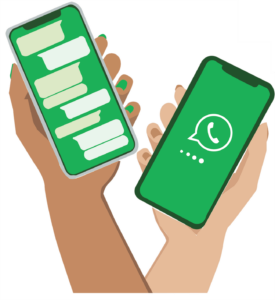
The WhatsApp Business API allows businesses to integrate WhatsApp into their communication systems. Businesses can set up automated messages for common queries and FAQs, improving efficiency. They can also send transactional messages such as order confirmations and shipping updates.
Moreover, businesses can use the WhatsApp Business API for personalized communication, addressing customers by their names and providing tailored information.
Understanding and effectively utilizing these features can significantly enhance a business’s marketing strategy on WhatsApp. It’s essential to maintain a balance between promotional content and providing value to the audience to build long-lasting relationships. Regularly analyzing metrics and customer feedback will help refine and optimize your marketing approach on WhatsApp.
Explore how you can leverage the power of WhatsApp Marketing – Talk to our Experts
Benefits of WhatsApp Marketing
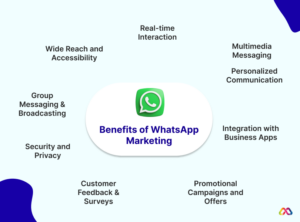
WhatsApp marketing can offer several benefits for businesses, helping them connect with customers and promote their products or services effectively. Here are some benefits of WhatsApp marketing for businesses:
Wide Reach and Accessibility
WhatsApp has over 2.7 billion monthly active users globally, providing a vast potential audience for businesses. It’s widely accessible across different devices, including smartphones and laptops, making it easier for businesses to reach a diverse audience.
Real-time Interaction
Businesses can engage with customers in real time, fostering immediate communication and quick response to inquiries. Real-time interactions enhance customer satisfaction and help build brand loyalty and trust.
Multimedia Messaging
WhatsApp allows the sharing of multimedia content, including images, videos, and audio messages. This feature enables businesses to create engaging and visually appealing content for promotions and advertisements.
Group Messaging and Broadcasting
Businesses can create groups or broadcast lists to send messages to multiple contacts simultaneously. This is useful for announcements, promotions, or updates. Group messaging can facilitate discussions and community-building among customers interested in a particular product or service.
Personalized Communication
WhatsApp enables businesses to send personalized messages, addressing customers by their names and tailoring content based on their preferences and previous interactions. Personalized communication enhances the customer experience and increases the effectiveness of marketing efforts.
Security and Privacy
WhatsApp uses end-to-end encryption, ensuring that messages are secure and private. This can be a crucial factor in gaining the trust of customers when handling sensitive information or transactions.
Integration with Business Apps
WhatsApp Business API allows integration with other business applications and tools, streamlining processes and enhancing efficiency. Integration can enable businesses to manage customer interactions, automate responses, and gather valuable data for analytics.
Customer Feedback and Surveys
Businesses can use WhatsApp to collect customer feedback, conduct surveys, and gather valuable insights into customer preferences and satisfaction. This feedback loop helps businesses make data-driven decisions and improve their products or services.
Promotional Campaigns and Offers
WhatsApp can be an effective platform for running promotional campaigns, offering exclusive discounts, and providing special offers to customers. Businesses can create a sense of exclusivity and urgency, driving customer engagement and sales.
While WhatsApp marketing offers numerous benefits, businesses should also be mindful of privacy regulations and best practices to ensure a positive and compliant marketing strategy.
Building Your WhatsApp Marketing Strategy
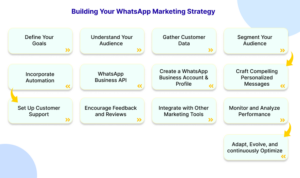
Building a WhatsApp marketing strategy for your business involves a thoughtful and customer-centric approach. Here’s a step-by-step guide for you:
Define Your Goals
Start by clearly defining your objectives. Are you looking to increase brand awareness, drive sales, provide customer support, or achieve something else? Knowing your goals will guide the rest of your strategy.
Understand Your Audience
Know your target audience—their preferences, behaviors, and communication habits. This understanding will help you tailor your messages to resonate with them.
Gather Customer Data
Collect and organize relevant customer data, including phone numbers and preferences. Ensure compliance with data privacy regulations.
Segment Your Audience
Divide your audience into segments based on demographics, preferences, behavior, or buying history. This allows you to craft and send more personalized messages most relevant for each segment.
Craft Compelling Personalized Messages
Create engaging and relevant content tailored to each audience segment. Since WhatsApp has the functionality, use multimedia elements like images, videos, and GIFs to make your messages more appealing.
Create a WhatsApp Business Account & Profile
Set up a dedicated WhatsApp Business account. This ensures that you have access to business-specific features and functionalities that will enable you to effectively communicate with your audience and build trust. Also, set up a WhatsApp Business Profile with essential information such as business hours, location, and website. Use a recognizable business logo as your profile picture.
WhatsApp Business API
Consider using the WhatsApp Business API for large-scale and automated communication. This allows you to send notifications, updates, and conduct transactions.
Incorporate Automation
Use chatbots for basic customer queries and interactions. Implement workflow automation for sending scheduled messages, updates, and reminders.
Set Up Customer Support
Use WhatsApp for customer support. Respond to queries promptly and provide solutions. A quick and helpful response builds brand loyalty and enhances the customer experience. Learn how to set auto reply in WhatsApp Business.
Encourage Feedback and Reviews
Actively seek customer feedback through surveys or direct messages. Positive reviews can be used in your marketing, and constructive feedback helps you improve.
Integrate with Other Marketing Tools
Explore integration options with other business tools. This could include CRM systems, analytics platforms, etc. Integration streamlines processes and enhances efficiency.
Monitor and Analyze Performance
You can’t manage what you can’t measure. Regularly track the performance of your WhatsApp marketing efforts. Analyze metrics such as open rates, click-through rates, and customer engagement. Use the insights gained to refine your strategy further.
Adapt, Evolve, and continuously Optimize
The digital landscape is dynamic. Stay updated with new WhatsApp features, industry trends, and customer preferences. Adapt your strategy accordingly to stay relevant and effective. Moreover, regularly review and optimize your WhatsApp marketing strategy based on performance metrics and customer feedback.
Remember, building a WhatsApp marketing strategy is an ongoing process. Stay authentic, listen to your customers, and continually refine your approach based on their feedback and changing market conditions.
Also Read: Meta Introduced New Features in WhatsApp for Business
Major Types of WhatsApp Marketing Campaigns
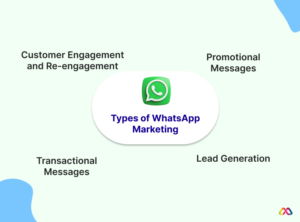
Promotional WhatsApp Marketing Campaigns
To put it simply, imagine you walk into a store, and there’s this enthusiastic salesperson telling you about the latest deals, discounts, and new products. Well, in the digital world, that’s essentially what a Promotional Campaign on WhatsApp is like. It’s a way for businesses to reach out to their potential customers directly with exciting offers, new launches, or exclusive deals.
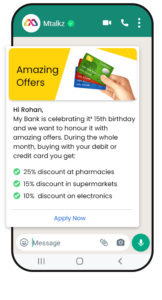
What’s Included in a Promotional Campaign?
Think of it as sending out virtual flyers or personalized messages to your customers. Businesses include things like:
New Product Announcements: “Hey there! We just launched this amazing new product, and as a valued customer, you get an exclusive discount.”
Limited-Time Offers: “Quick! Our weekend sale is on. Get 20% off on all items until Sunday. Don’t miss out!”
Exclusive Discounts: “Here’s a special code for our WhatsApp subscribers. Use it during checkout for an extra 15% off.”
Flash Sales: “Hurry! Flash sale alert. Selected items at jaw-dropping prices, valid for the next 24 hours only.”
How Can Businesses Benefit from Promotional Campaigns on WhatsApp?
Well, it’s like having a direct line to your customers’ pockets, but in a non-intrusive way. People are already using WhatsApp daily, so when a business sends a well-crafted promotional message, it’s likely to catch their attention.
Here are some benefits:
Increased Sales: By offering exclusive deals, businesses can encourage customers to make purchases they might not have considered otherwise.
Customer Loyalty: It’s a great way to reward your existing customers. They feel special, knowing they’re getting insider information and exclusive discounts.
Brand Visibility: Regular promotions keep your brand in the minds of customers. When they think about a product or service you offer, they’re more likely to turn to your business.
Instant Communication: Unlike some other forms of advertising, WhatsApp allows for instant communication. Customers can ask questions, seek clarification, or make a purchase right there in the chat.
Unlock your Business Potential with Mtalkz
Tips for Businesses Running Promotional Campaigns
Keep it personal and engaging. Instead of bombarding customers with generic messages, tailor your promotions to their preferences. And always make it easy for them to take action – whether it’s making a purchase or getting more information.
So, it’s like bringing the charm of a local store’s salesperson to the digital world – friendly, helpful, and always ready with a good deal.
Transactional WhatsApp Campaigns
Think about those messages you get after ordering something online – the ones that confirm your purchase, let you know when it’s shipped and reassure you that everything is on track. Those are transactional messages. In WhatsApp Marketing, it’s like having a super efficient and friendly assistant keeping you in the loop about your transactions.
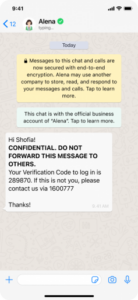
What’s Included in a Transactional Messages Campaign?
It’s the real nitty-gritty of customer-business relationships. Businesses send:
Order Confirmations: “Hey there! We got your order. Your favorite product is on its way to being yours.”
Shipping Updates: “Exciting news! Your package has been shipped. Track it here.”
Delivery Notifications: “Guess what? Your order has been delivered. We hope you love it!”
Account Information Updates: “Just a quick heads up – your account password has been changed. If it wasn’t you, let us know.”
How Can Businesses Benefit from Transactional Messages on WhatsApp?
It’s like providing a smooth, worry-free journey for your customers. Here’s how:
Builds Trust: When customers receive timely updates about their orders, it builds trust. They know what’s happening every step of the way.
Reduces Customer Anxiety: Ever ordered something and wondered, “Where is it?” Transactional messages take away that uncertainty and keep customers informed.
Enhances Customer Experience: It’s all about making the customer’s life easier. With transactional messages, they don’t have to go digging for information – it’s delivered right to their WhatsApp.
Encourages Repeat Business: A positive buying experience, thanks to clear and timely communication, encourages customers to come back for more.
Streamline your Transactional Messaging with Mtalkz
Tips for Businesses Sending Transactional Messages?
Keep it friendly and straightforward. Use language that makes customers feel taken care of. Also, consider adding a touch of personality – it’s not just a transaction; it’s a shared experience.
So, think of it as having a thoughtful friend who keeps you updated on everything you need to know about your purchases. No more wondering where your package is or if your order went through – it’s all right there in your WhatsApp chat.
Lead Generation WhatsApp Campaigns
Imagine you’re at a party, and you strike up a conversation with someone interested in what you do. They ask for your contact details because they want to know more. In the digital world, that’s a bit like what a Lead Generation Campaign on WhatsApp does. It’s about finding people who are genuinely interested in your business and creating a connection.
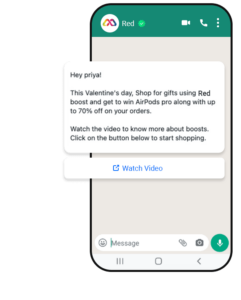
What’s Included in a Lead Generation Campaign?
It’s like inviting people to join a conversation. Businesses include things like:
Engaging Content: “Hey! We’ve got some exciting tips and tricks about [industry]. Would you like to receive them?”
Exclusive Offers: “Be the first to know about our special promotions! Subscribe to get exclusive discounts delivered to your WhatsApp.”
Newsletter Sign-ups: “Love our content? Sign up for our newsletter on WhatsApp to get the latest updates directly to your chat.”
Interactive Content: “Take our quick quiz to discover the perfect product for you! Just reply with ‘Yes,’ and we’ll get started.”
How Can Businesses Benefit from Lead Generation on WhatsApp?
It’s like making friends who are genuinely interested in what you have to offer. Here’s how businesses benefit:
Quality Connections: Instead of reaching a broad audience, businesses connect with people who are genuinely interested in their products or services.
Personalized Communication: Once you have leads, you can tailor your messages to their preferences. It’s like having a more personal conversation rather than a one-size-fits-all broadcast.
Builds Relationships: By engaging with potential customers on a more personal level, businesses start building relationships. It’s not just about selling, it’s about creating a connection.
Direct Communication: WhatsApp provides a direct line of communication. Businesses can reach out, share valuable content, and answer questions in real time.
Capture more leads for your business. Talk to us.
Tips for Businesses Running Lead Generation Campaigns?
Keep it genuine and focus on value. Let people know what’s in it for them. Also, make it easy for them to join the conversation – a simple ‘Yes’ can go a long way.
So, think of it as starting a conversation at a networking event, where you exchange information with people who are genuinely interested in what you do. It’s not just about getting contacts; it’s about building meaningful connections in the digital world.
Customer Engagement and Re-engagement WhatsApp Campaigns
In the realm of business, Customer Engagement and Re-engagement Campaigns on WhatsApp are a strategic effort to maintain an ongoing conversation with customers, ensuring that a brand remains top-of-mind. By sharing updates, exclusive offers, and expressing gratitude, businesses aim to foster a sense of loyalty and connection.
Re-engagement campaigns, in particular, act as a friendly nudge to customers who might have become less active, inviting them back into the fold with tailored incentives and a reminder of the value the brand offers.
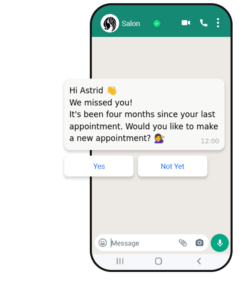
What’s Included in Customer Engagement and Re-engagement Campaigns?
It’s like sending a friendly “hello” to your customers. Businesses include things like:
Personalized Updates: “Hey [customer’s name]! We thought you might like to know about our latest products. Check them out!”
Exclusive Offers for Previous Customers: “As a thank you for being a valued customer, here’s an exclusive discount just for you. We miss you!”
Surveys and Feedback Requests: “We value your opinion! Could you take a minute to share your thoughts on our products and services?”
Anniversary or Milestone Celebrations: “It’s been a year since you joined us! We want to celebrate this milestone with a special offer just for you.”
How Can Businesses Benefit from Customer Engagement and Re-engagement on WhatsApp?
It’s like keeping the flame alive in a friendship. Here’s how businesses benefit:
Customer Retention: By staying connected, businesses increase customers’ likelihood of sticking around. It’s about maintaining that relationship.
Feedback and Improvement: Surveys and feedback requests help businesses understand their customers better, allowing them to make improvements based on real insights.
Brand Loyalty: Exclusive offers and personalized updates make customers feel special. It’s like saying, “We appreciate you, and here’s something just for you.”
Reactivating Dormant Customers: Re-engagement campaigns are like sending a friendly invitation to those who haven’t interacted in a while, encouraging them to rekindle the relationship.
Tips for Businesses Running Customer Engagement and Re-engagement Campaigns?
Keep it warm and authentic. Let customers know you genuinely appreciate them. Also, be mindful of their preferences and tailor your messages accordingly.
So, it’s a bit like reaching out to an old friend, catching up, and letting them know you’re thinking of them. In the business world, it’s about maintaining connections, celebrating milestones, and ensuring that customers know they’re valued beyond just a transaction.
Also Check: WhatsApp Business API Pricing in India
Best Practices for WhatsApp Marketing
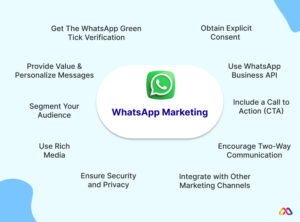
Here are some best practices for businesses engaging in WhatsApp marketing:
Get The WhatsApp Green Tick Verification
The WhatsApp Green Tick validates a business account, assuring users of its authenticity. This mark indicates that WhatsApp has verified it as a genuine business, instilling confidence in customers about the legitimacy and reputation of the account. Learn how to get the WhatsApp Green Tick Verification.
Obtain Explicit Consent
Ensure that users have given explicit consent before sending them marketing messages on WhatsApp.
Provide Value & Personalize Messages
Deliver content that is relevant, valuable, and interesting to your audience. Moreover, use customer data to personalize messages and provide a more tailored experience.
Use WhatsApp Business API
For larger-scale marketing efforts, consider using the WhatsApp Business API for enhanced features and capabilities.
Segment Your Audience
Divide your audience into segments based on demographics, preferences, or behavior to send more targeted messages.
Include a Call to Action (CTA)
Clearly state the desired action you want users to take, whether it’s making a purchase, visiting a website, or participating in a survey.
Use Rich Media
Leverage the multimedia capabilities of WhatsApp by incorporating images, videos, and audio to make your messages more engaging.
Encourage Two-Way Communication
Allow users to respond and engage with your messages. Be responsive to their inquiries and feedback.
Ensure Security and Privacy
Prioritize the security and privacy of user data. Clearly communicate how their information is handled and protected.
Integrate with Other Marketing Channels
Integrate WhatsApp marketing with your overall marketing strategy to create a cohesive and consistent brand presence.
Remember, maintaining a positive user experience and respecting user privacy are paramount for successful WhatsApp marketing. Always stay informed about any updates or changes in WhatsApp policies to ensure compliance.
Get a free consultation with our WhatsApp experts for guidance
WhatsApp Marketing Automation
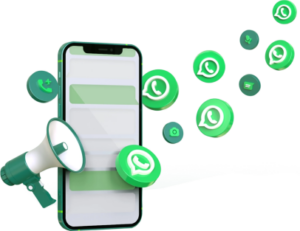
This is the era of Automated WhatsApp Marketing – where technology meets communication to revolutionize how businesses connect with their customers. At the heart of this transformation are Chatbots, virtual assistants powered by artificial intelligence, designed to elevate your brand’s engagement on the popular messaging platform.
Introduction to WhatsApp Chatbots
WhatsApp chatbots are virtual assistants that use artificial intelligence to simulate conversations with users. In the context of WhatsApp Marketing, businesses can deploy WhatsApp chatbots to interact with customers, answer queries, and provide information. These bots offer a seamless and instant communication channel, enhancing customer engagement.
Automated Responses and FAQs
With WhatsApp Automation, businesses can automate responses to frequently asked questions (FAQs). By programming the WhatsApp chatbot to recognize common queries, businesses can ensure that customers receive quick and accurate information. This not only saves time but also provides a consistent and efficient customer service experience.
Leveraging AI for Personalized Experiences
Artificial intelligence can analyze customer data and preferences to deliver personalized experiences. In WhatsApp Marketing, businesses can use AI algorithms to understand user behavior, tailor recommendations, and suggest relevant products or services. This personal touch enhances customer satisfaction and builds a stronger connection between the brand and the consumer.
In essence, the integration of chatbots and AI in WhatsApp Marketing streamlines communication, provides instant solutions, and creates a more personalized interaction with customers. This not only saves time and resources for businesses but also contributes to an enhanced customer experience.
Measuring the Success of WhatsApp Marketing: Key Metrics
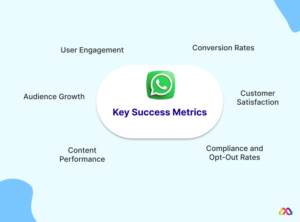
Measuring the success of WhatsApp marketing involves assessing the performance and impact of your marketing efforts on the platform. Here are key aspects and metrics to consider when evaluating the success of your WhatsApp marketing campaigns:
User Engagement
Message Open Rates: Measure the percentage of sent messages that recipients actually open. This metric provides insights into the effectiveness of your message in grabbing attention.
Response Rates: Track how many users engage with your messages by responding. This can help gauge the level of interest and interaction.
Conversion Rates
Click-Through Rates (CTR): Monitor the percentage of users who click on links or calls-to-action (CTA) within your messages. This indicates how well your content motivates users to take further action.
Conversion Tracking: If your goal is to drive specific actions (e.g., purchases, sign-ups), track the conversion rates to measure the success of your WhatsApp campaigns in achieving these objectives.
Audience Growth
Subscriber Growth: Keep track of the number of new subscribers to your WhatsApp business account. This helps measure the success of your efforts in expanding your audience.
Churn Rate: Assess how many subscribers you lose over time. A high churn rate may indicate issues with content relevance or frequency.
Customer Satisfaction
Feedback and Reviews: Encourage users to provide feedback on your products or services through WhatsApp. Positive reviews and testimonials can be valuable indicators of customer satisfaction.
Customer Support Metrics: If you use WhatsApp for customer support, measure response times and resolution rates to ensure a positive customer experience.
Content Performance
Content Views: Evaluate the number of times your multimedia content (images, videos, documents) is viewed. This can help you understand which types of content resonate most with your audience.
Sharing Metrics: Track the number of times your content is shared. This indicates not only engagement but also the potential for expanding your reach through viral sharing.
Compliance and Opt-Out Rates
Compliance Metrics: Ensure that your WhatsApp marketing adheres to relevant regulations and guidelines. Monitor any issues related to spam complaints or violations.
Opt-Out Rates: Track the number of users who opt out of receiving messages. High opt-out rates may suggest a need for adjustments in your messaging strategy.
Regularly analyzing these metrics and adjusting your strategy accordingly will help you optimize your WhatsApp marketing efforts and enhance overall campaign success.
Challenges in WhatsApp Marketing and their Solutions
WhatsApp Marketing can be an effective strategy for businesses to connect with their audience, but like any marketing channel, it comes with its own set of challenges. Here are some common challenges in WhatsApp Marketing for businesses and their potential solutions:
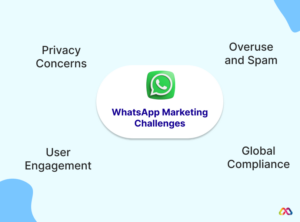
Privacy Concerns
Challenge: Users are increasingly concerned about privacy and may hesitate to share personal information on WhatsApp.
Solution: Clearly communicate how you handle user data and ensure compliance with privacy regulations. Use opt-in mechanisms to obtain user consent before sending marketing messages.
Overuse and Spam
Challenge: Excessive messaging or irrelevant content can lead to users marking your messages as spam.
Solution: Provide valuable and targeted content. Use segmentation to send personalized messages to specific user groups. Set clear expectations and frequency about the messages during the opt-in process.
User Engagement
Challenge: Users might not actively engage with WhatsApp messages, since they’re coming from a business account leading to low conversion rates.
Solution: Encourage interaction by asking questions, running polls, or providing exclusive offers through WhatsApp. Create compelling and relevant content to grab users’ attention.
Global Compliance
Challenge: WhatsApp Marketing needs to comply with various international regulations, including GDPR and CCPA.
Solution: Stay informed about global data protection regulations and ensure that your marketing practices comply. Obtain explicit consent from users before sending them marketing messages.
Successfully navigating the challenges of WhatsApp Marketing requires a combination of strategic planning, adherence to best practices, and a commitment to user privacy and engagement. By addressing these challenges, businesses can leverage WhatsApp as a powerful tool to connect with their audience in a direct and personal way.
Let our team handle the challenges for you. Talk to us
To Conclude
Mastering WhatsApp marketing is an indispensable skill for businesses aiming to connect with their audience in the digital age. As we’ve explored the multifaceted landscape of WhatsApp marketing, it is evident that leveraging the platform effectively involves a nuanced understanding of its features, strategic planning, and adherence to best practices.
From the fundamental importance of WhatsApp marketing in today’s business landscape to the detailed exploration of its features and various campaign types, businesses can now navigate this dynamic platform with confidence. Understanding the significance of personalization, segmentation, and the judicious use of multimedia enhances the impact of marketing efforts, fostering meaningful connections with the target audience.
The incorporation of automation, especially through chatbots and AI, not only streamlines processes but also allows businesses to deliver personalized experiences at scale. However, in the pursuit of success, it is crucial to keep a vigilant eye on key metrics, ensuring that campaigns are not only reaching but also resonating with the audience. Metrics such as delivery and read receipts, conversion rates, and customer feedback serve as vital indicators of a campaign’s efficacy.
Yet, the journey of WhatsApp marketing is not without its challenges. Privacy concerns, the specter of spam, and the need to align with WhatsApp policies pose ongoing challenges. Businesses must proactively address these issues, fostering a culture of respect for user privacy and compliance with platform guidelines.
In essence, WhatsApp marketing is a dynamic realm where innovation, strategy, and ethical considerations converge. As businesses embrace the power of WhatsApp for marketing purposes, a thoughtful approach, grounded in the understanding of the platform’s nuances, will undoubtedly pave the way for meaningful connections, enhanced customer experiences, and ultimately, success in the digital marketplace.

